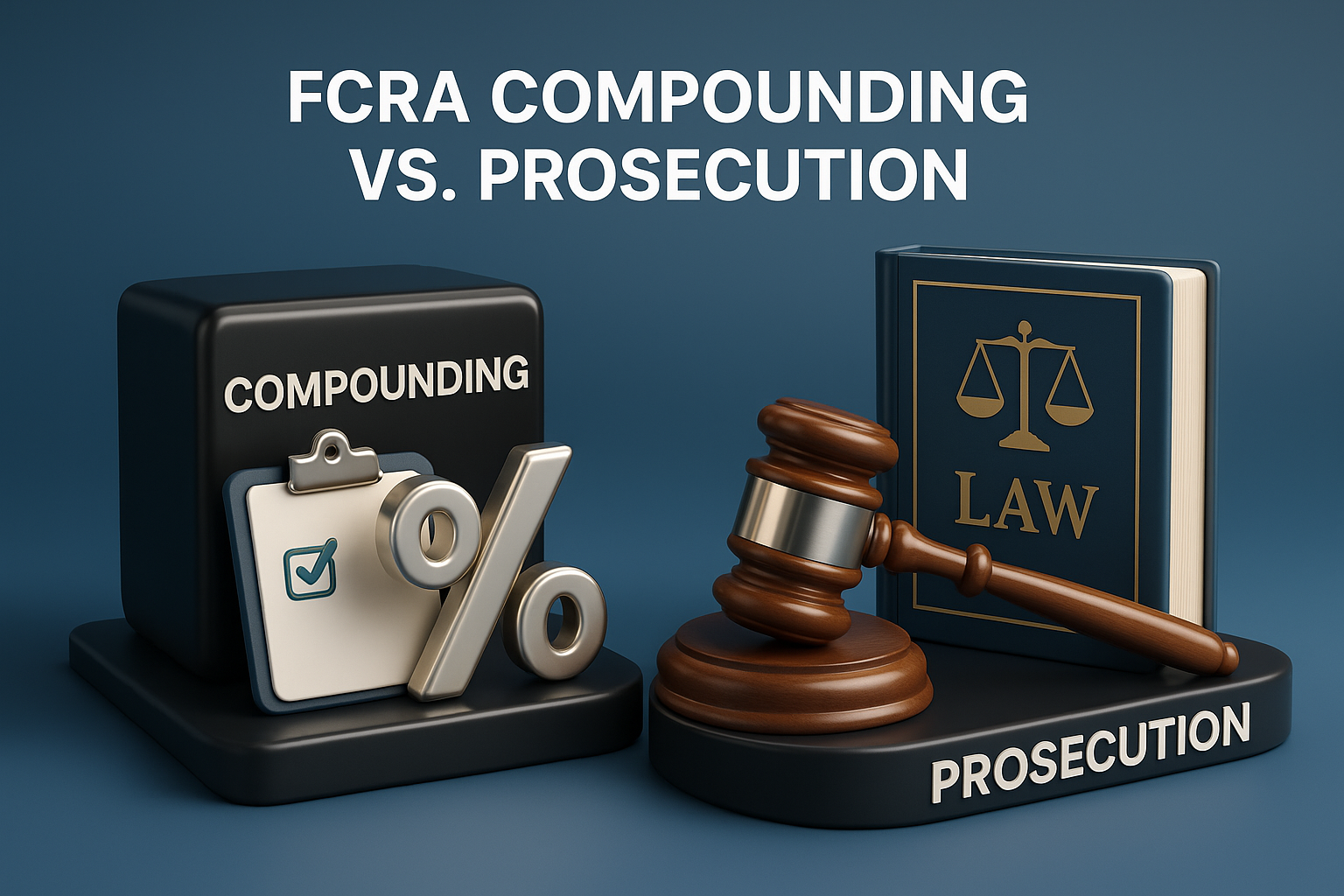
FCRA Compounding vs. Prosecution Handling Past Violations
Overview
The FCRA, 2010, provides two distinct pathways for addressing violations: compounding and prosecution. Compounding allows NGOs to settle certain offenses by paying a penalty, avoiding the rigors of court proceedings, while prosecution involves legal action that can result in fines, imprisonment, or cancellation of registration. Understanding these options and the steps to handle past violations is crucial for NGOs to mitigate risks and maintain their operational integrity. The 2022 amendments expanded the list of compoundable offenses, offering NGOs more opportunities to resolve minor violations, but serious breaches still face prosecution.
Statutory Framework
Section 41 of the FCRA, 2010, empowers designated officers, such as those from the MHA, to compound certain offenses before prosecution is initiated, upon payment of a specified penalty. The Foreign Contribution (Regulation) Amendment Rules, 2022, effective from July 1, 2022, increased the number of compoundable offenses from 7 to 12, including accepting foreign contributions without registration (penalty: 10
Compounding vs. Prosecution
Compounding is a streamlined process that allows NGOs to settle violations by paying a penalty, avoiding the time-consuming and costly process of prosecution. It is suitable for minor or technical violations, such as failing to file annual returns or receiving funds in a non-designated account. The process requires an application to the competent authority, typically the MHA, and approval is at their discretion. Prosecution, however, involves formal legal action in court, typically for serious violations like misuse of funds for political activities or repeated non-compliance. Prosecution can lead to severe consequences, including cancellation of FCRA registration and reputational damage. The choice between compounding and prosecution depends on the nature of the violation and the NGOs ability to address it promptly.
Handling Past Violations
To address past FCRA violations, NGOs should follow a structured approach:- **Assess the Violation**: Determine if the offense is compoundable by referring to the MHAs notification of July 1, 2022, which lists 12 compoundable offenses.- **Apply for Compounding**: If eligible, submit an application to the MHA or designated officer before prosecution begins, accompanied by relevant documentation and the specified penalty.- **Seek Legal Advice**: Engage legal experts to evaluate the violations severity and prepare for compounding or prosecution. For non-compoundable offenses, legal counsel can help build a defense.- **Rectify Compliance**: Address the root cause of the violation, such as improving record-keeping or ensuring proper account usage, to prevent recurrence.- **Maintain Transparency**: Provide accurate information to the MHA during the compounding process and maintain detailed records to support compliance efforts.
Judicial and Regulatory Insights
The MHAs notification of July 1, 2022, expanded the scope of compoundable offenses, reflecting a policy shift toward facilitating compliance for minor violations. The Supreme Courts 2022 ruling upholding FCRA amendments emphasized the governments authority to enforce strict penalties for non-compliance, reinforcing the importance of compounding as a preventive measure. Cases like the 2017 suspension of the Public Health Foundation of Indias FCRA registration for alleged mis use highlight the MHAs vigilance, underscoring the need for NGOs to address violations promptly.
Practical Scenarios
An NGO that accepted a Rs. 5 lakh foreign contribution without registration applies for compounding, paying a penalty of Rs. 50,000 (10
Common Pitfalls and Mitigation Strategies
A common error is delaying action on violations, assuming they will go unnoticed, which risks prosecution. NGOs should proactively assess violations and apply for compounding immediately. Another pitfall is in adequate documentation, such as failing to provide evidence of compliance, which can hinder compounding efforts. Maintaining detailed records mitigates this. Misinterpreting compoundable offenses, assuming all violations can be settled, is another mistake; NGOs should consult the MHAs notification to confirm eligibility. Lastly, failing to rectify compliance issues post-compounding can lead to repeated violations; implementing robust governance systems prevents recurrence.
Professional Recommendations
NGOs should promptly assess violations to determine if they are compoundable, referring to the MHAs 2022 notification. Submitting a compounding application with accurate documentation and engaging legal experts to navigate the process is critical. Addressing the root cause of violations, such as improper account usage or non-filing of returns, ensures long-term compliance. Regular audits and training on FCRA regulations strengthen governance. NGOs should also maintain open communication with the MHA to resolve issues transparently, minimizing the risk of prosecution.
Conclusion
Compounding offers a practical solution for settling minor FCRA violations, while prosecution addresses serious breaches with severe consequences. By assessing violations, applying for compounding when eligible, and seeking legal advice, NGOs can mitigate risks and maintain their registration. Proactive compliance and transparency are key to avoiding the costly and disruptive process of prosecution.
Introduction: Section 8 Companies, a distinctive provision under the Companies Act, 2013, embody ...
Treatment of Foreign Services Online Courses, Webinars by NGOs FCRA Risk Overview T...
Latest Rules for Renewal of 12AB & 80G Registrations Under current tax law, registe...
The rules and regulations that govern the functioning and operations of an Association of Persons ...
FCRA Renewal Process: Timeline, Documents, and Grounds for Rejection Overview The FCR...
Maintaining Books of Accounts for NGOs Legal Framework Maintaining accurate books of ...
Treatment of NGO Consultancy Income Overview NGOs often augment their resources by of...
Difference Between Trust, Society, and Section 8 Company Selecting the right NGO structure (Trus...
Is GST Registration Required for Section 8 Companies? With the introduction of the Goods and Ser...
High-Profile FCRA Cancellations and Key Lessons Overview The MHAs cancellation of ove...